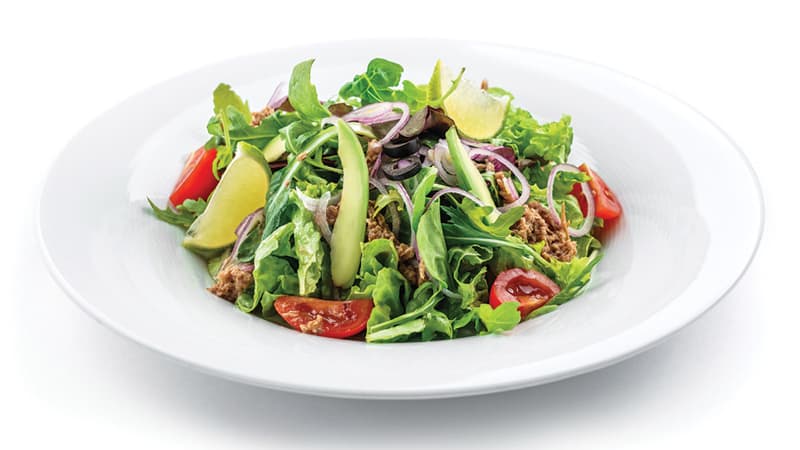Using Diet to Help Manage Menopause
Take a bite out of hormones

Oh, I’d heard about the symptoms of menopause, like spontaneously breaking out in perspiration from a hot flash. The rumors became my reality the night I awoke from a deep sleep with night sweats! Not all menopause symptoms are that obvious. Some sneak in more slowly, interrupting your daily routine, zapping energy or clouding concentration. While some foods can aggravate symptoms, healthier choices may offer relief.
TRIGGER FOODS
Monitor what you eat and drink to determine whether your choices cause or exacerbate hot flashes. Spicy foods, hot beverages, alcohol and caffeine can be triggers. Eliminate or decrease the offenders to feel better.
SOY JOY!
Soy-based foods may help reduce hot flashes. They have isoflavones (plant estrogens) that can help balance the decreasing estrogen levels of menopause. Add soy to meals using soy milk, soy yogurt, soybeans, edamame, tofu, tempeh or soy meat substitutes. Research suggests breast cancer survivors can consume soy foods in moderation. Check with your health care provider before taking soy supplements, as isoflavone content varies.
IT’S A WEIGHTY ISSUE
Weight loss helps, too. Yet, at the same time, changing hormone levels and the natural aging process can contribute to weight gain. There’s no quick fix, and strict fad diets don’t work in the long run. Start by eliminating poor habits such as skipping meals, late-night snacking and consuming excess chips, sweets and sweetened beverages. Swap poor food choices for healthier and lower-calorie foods, but avoid the trap of overly restricting calories.
Studies show regularly eating foods from the Mediterranean diet can reduce some symptoms while adding health benefits. These include whole grains, fruits, vegetables, beans, nuts and healthy fats such as olive oil. Choose more fish and seafood for Omega-3 fats and protein. Enjoy more plant proteins (beans, nuts, seeds) over dairy and chicken, while limiting red meat.
MAKE NO BONES ABOUT IT
During menopause, women lose more bone mass than is being replaced. It’s important to get enough calcium daily, both now and after menopause, to protect your bones. Women 51 and over need 1200 milligrams daily. Adult premenopausal women need 1000 milligrams. Food sources are best: dairy milk, fortified nondairy milks and juices, hard cheese, yogurt, tofu, kale and broccoli.
If you can’t get enough calcium through foods, supplements will help. The best brands are made with calcium citrate (take with or without food) or calcium carbonate (must take with food). Neither are well absorbed over 500 milligrams at a time, so spread doses throughout the day. Taking excess calcium through supplements doesn’t add bone mass and may increase risk of kidney stones, heart disease and stroke.
Vitamin D helps calcium to be absorbed. It comes from the sun, but if you use sunscreens or don’t go outside much, it’s hard to get enough. Food sources of vitamin D are limited to cod liver oil, salmon and other fatty fish, with smaller amounts in fortified milk and juices. Supplements can help meet the goal. Postmenopausal women over 50 need 800 International Units (20 micrograms) daily. Premenopausal adult women need 600 International Units (15 micrograms). You may require a prescription dose if you’re deficient.
PROTEIN PLUS
Estrogen’s decline during menopause leads to decreased muscle mass. Menopausal and postmenopausal women need to eat more protein daily to protect it. Needs vary, but women over 50 should aim for 0.45 to 0.55 grams of protein per pound. Consuming 20-25 grams of protein each meal can help. Good protein sources include chicken or tuna, low-fat milk and cottage cheese, nuts, beans and protein shakes.
Consuming adequate protein, vitamin D and calcium is very important. Combined with regular weight-bearing and muscle-strengthening exercises, it helps protect bone and muscle mass while reducing risks from falls, fractures and osteoporosis.
Mary-Jo Sawyer is a registered dietitian with VCU Health where she provides outpatient nutrition counseling. As a Richmond-Times Dispatch columnist, she wrote the popular “Practical Nutrition” column.


